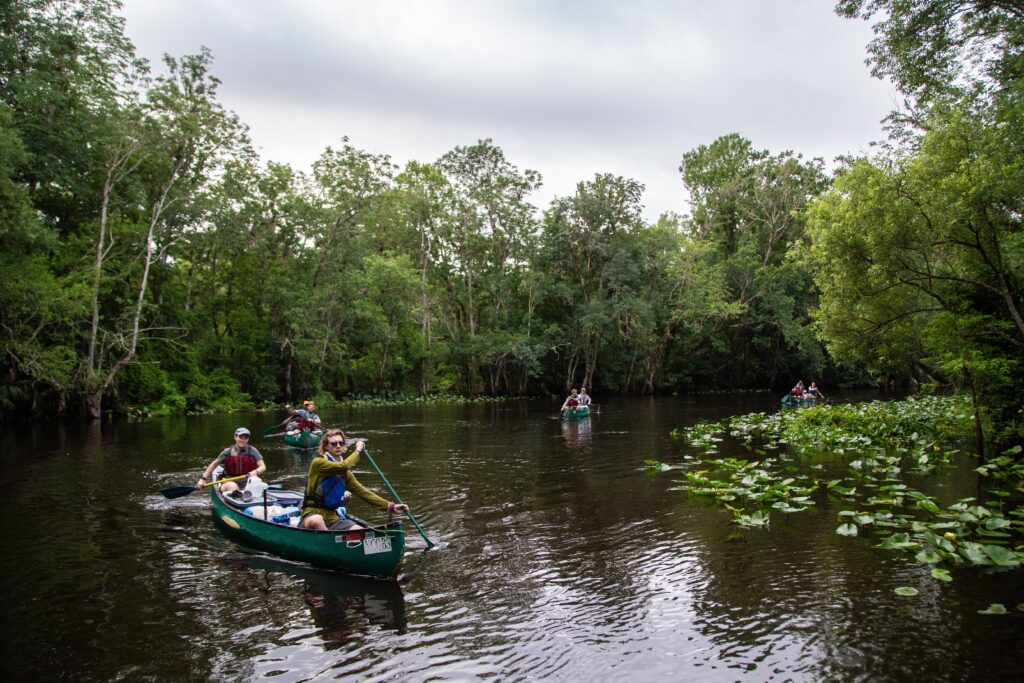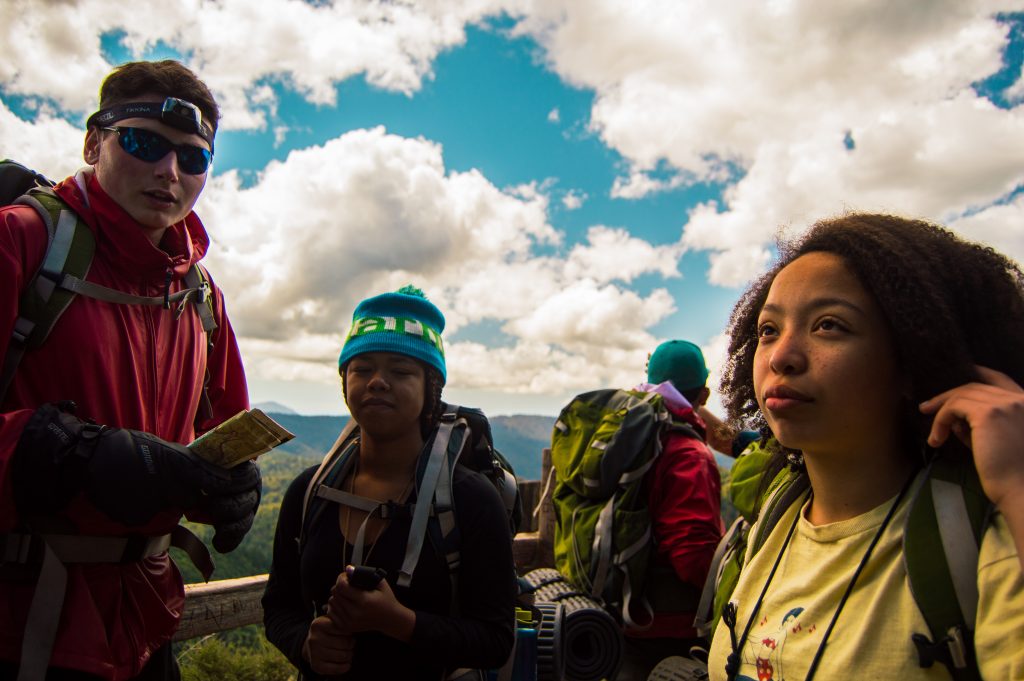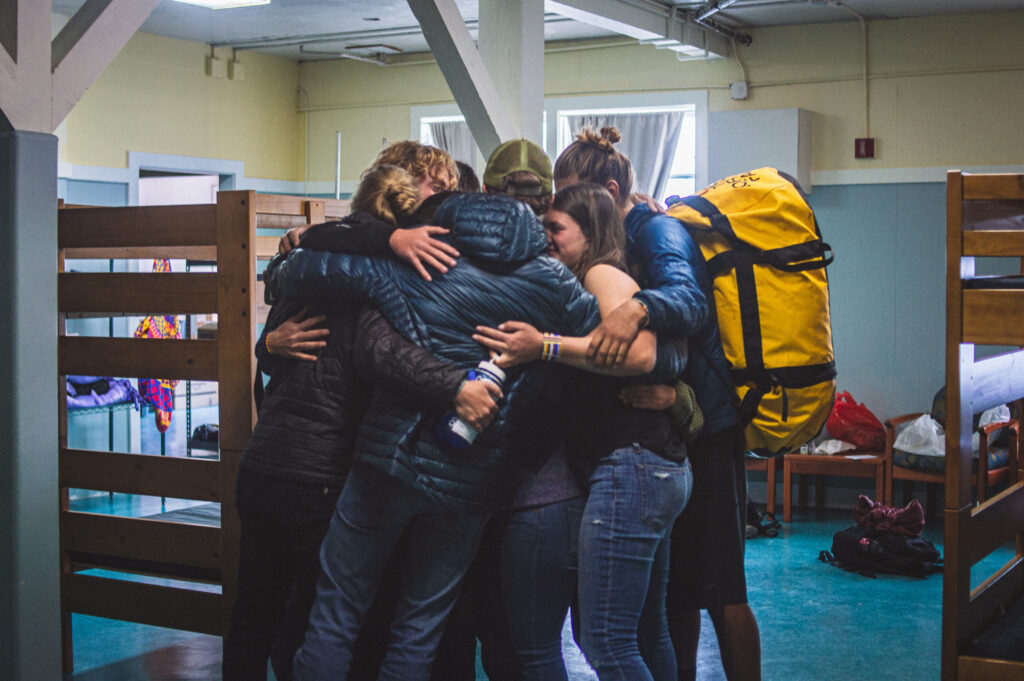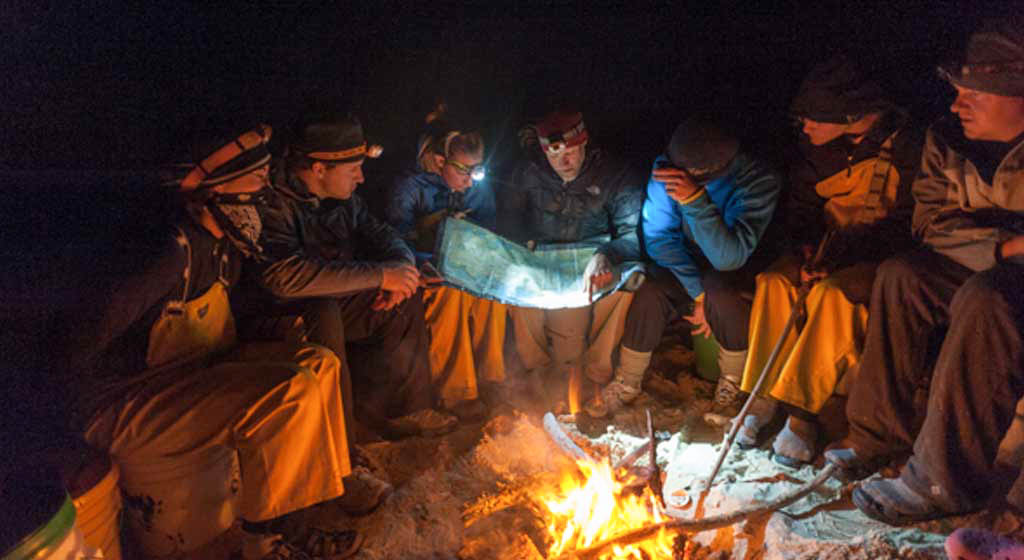You might think that showing up for an Outward Bound course means arriving at basecamp on day one with the packing list essentials and a yearning for adventure. That’s a good start! Just getting yourself there is exciting and nerve-wracking. While showing up is the first step, it is only the first of many. You will be encouraged to show up and face every exciting and nerve-wracking challenge that comes up throughout your course. Those challenging experiences teach you skills that will go a long way when you need to show up for people long after your Outward Bound course has ended.
I remember facing a particular challenge on a flatwater canoeing expedition in Florida about a year ago. It was nighttime and completely dark except for our navigation flashlight, and a few miles prior, the river widened, and therefore the current slowed. The water was low and the river was experiencing unprecedented amounts of water cabbage, which grew thick and close together, making it nearly impossible to dip a paddle underwater and propel our boats. In other words, we were stuck—landlocked in water cabbage.

Photo By James Mixon
Do You Show up for People in Your Life?
It can be easier to be present in the backcountry as opposed to the frontcountry because matters are so pressing. Immediate focus is required not just for comfort but also for survival. I recall being faced with this water cabbage challenge and deciding to show up. Fortunately, so did the rest of my crew. Ultimately, we sweated and worked ourselves through the most direct line to land, where we made camp that night. It took almost an hour for us to heave our boats through 30 yards of vegetation, something that would normally take one minute. We advanced one power stroke at a time, single file in our canoes, unable to walk or swim them to shore because of the risk of alligators in the water. It was an impressive feat and one that my whole crew showed up for.
Though these types of intense misadventures are less likely in the frontcountry, we are capable of channeling that same level of focus and presence into experiences that aren’t quite as risky. One way to translate that into regular life is to be present with people. Like in the water cabbage situation, we all had to be attentive out of necessity, even fear. We had to communicate about where each canoe was in the dark and how each paddler was managing. But in lower stakes situations, too, we can be attentive by, for example, practicing active listening and be tuned in to others when they share their ideas and experiences. This is such an important time to listen and form our own educated opinions on matters that can be polarizing.

Photo by David Montero
Do You Show up for Yourself?
Have you been practicing self-care in the past eight months of life inside of a pandemic? What about resting when you need it? Are you nourishing your body and your mind? Have you taken inventory of your life—what do you want to keep, what are you ready to let go of, what are you working toward? Have you checked in with yourself? With a therapist? With a confidant?
We have to show up for ourselves before we can be of service to others. Just like on an Outward Bound course, we need to manage our own needs first. For example, if I’m seven miles into our paddle and I haven’t sipped on my water in hours, I’m not showing up for myself with my best foot forward. I’m cranky, I have a headache, I’m tired. This isn’t the version of me that I want to deal with. So showing up for myself, in this case, starts with a sip of water.
Do You Show up for Your Community?
It took my entire crew—my entire community—to paddle through the water cabbage that night. None of us could have done it alone. We each needed to show up for one another. The same can be said of our relationships in the frontcountry.
Are you engaging with your family from a place of compassion and patience? What about having conversations with your housemates about how you all are feeling? Are you staying in touch with your long-distance loved ones with phone calls, snail mail, texts?

Photo by David Montero
I’ve recently been on the receiving end of my community showing up for me, and I couldn’t be more grateful. Just when I felt like I wasn’t making any progress in picking my life back up since being laid off, I’ve had friends and family helping me look for housing, or offering me a room to sublet in their homes. I’ve had former co-workers send me links to job applications for jobs to which they think I’d be a good fit. I’ve had people send a quick text to make me smile because they know I’ve been down. There’s a lot that I’m doing for myself to keep myself balanced, but it’s my community that gives me the motivation to keep going.
Additionally, I feel safe within my intimate community. Safe to have hard conversations for the first time—about race, socioeconomic status, politicians, etc. These are the people who share their life experiences and opinions with me, which then help to shape my values. It’s important that I reciprocate in those relationships. I also must expand beyond the community I know and engage with other people I don’t know or necessarily agree with in society at large.
Do You Show up for Society?
A few days ago, the Presidential election took place. Whoever your nominee was and whatever the outcome, now is the time to listen empathetically, come up with solutions and act on those plans. We are all capable of being change agents, and we have a whole crew to help us paddle through the water cabbage.

Photo by William Jewell
What Is Your Role in the Social Change Ecosystem?
Recently, what has been your role in helping people struggling with complications created by COVID-19, like lost housing, lost jobs, lost health and lost loved ones? What has been your role in dismantling systemic racism? Did you vote? Did you consider the impact of your votes? Where are you putting your money? Where are you putting your time?
What Does This Have to Do With Outward Bound?
In the 1930s, Founder of Outward Bound Kurt Hahn voiced his opposition to Hitler and the Nazi Party. He famously asked those associated with the Salem School (a predecessor of the Outward Bound schools we have today) to either “break with Hitler or break with Salem.” Hahn used his power to speak out against injustice, therefore showing up for a marginalized community.
“There are three ways of trying to win the young. There is persuasion, there is compulsion and there is attraction. You can preach at them, that is a hook without a worm; you can say ‘you must volunteer,’ and that is of the devil; and you can tell them, ‘you are needed,’ that appeal hardly ever fails.” – Kurt Hahn, founder of Outward Bound
While Hahn’s original intention of his above quote was in regards to young people, it has evolved to pertain to anyone. We are all needed. We all need to show up for ourselves, for our immediate communities, and our greater society.
What power or platform do you have, and how can you use it to promote equity in this time of social unrest? How can you show up? You are needed.
About the Author
Elizabeth Bowling is a field Instructor for the North Carolina Outward Bound School. Elizabeth has a degree in journalism and international studies from the University of Connecticut.




